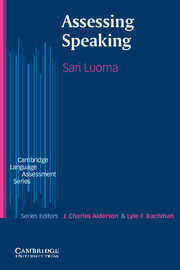Summary
When we are assessing speaking, we guide the examinees' talk by the tasks that we give them. These outline the content and general format of the talk to be assessed and they also provide the context for it. As we saw in the previous chapter, language use varies by purpose and context, so task design is a very important element in developing assessments.
Task design begins with the needs of the assessment situation, as pointed out in Chapter 1. The purpose of the test and the practical circumstances in which it will be arranged set the general guidelines, but the most important factor when designing tasks is the construct-related information that the scores must deliver, or in other words what the score users need to know about the examinees' speaking skills. This dictates the types of skills that the tasks should make the examinees show. In learning-related assessment, this is often guided by what has been taught recently, but end-of-course tests may need to provide more general information about the examinees' skills, more or less like formal, external examinations. Existing research on speaking tasks can help task design. In this chapter, I will summarise the current state of this research.
Furthermore, to put their speaking tasks into practice, assessment designers need to create not only the tasks but also the instructions to be given to the examinees, the task materials such as pictures or role-play cards that will be needed, and the instructions to interlocutors that will be used.
- Type
- Chapter
- Information
- Assessing Speaking , pp. 29 - 58Publisher: Cambridge University PressPrint publication year: 2004

